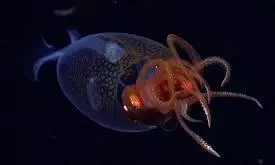
Colossal squid spotted alive for first time in a century in deep ocean
text_fieldsIn a remarkable marine breakthrough, scientists have captured the first-ever footage of a colossal squid alive and swimming in the wild - marking the first confirmed sighting of the mysterious deep-sea creature in over 100 years.
The rare encounter took place on March 9 during an expedition by the Schmidt Ocean Institute aboard the research vessel Falkor. While exploring the waters between Argentina and Antarctica, researchers used a remotely operated vehicle to film a juvenile Mesonychoteuthis hamiltoni, commonly known as the colossal squid, at a depth of around 600 metres near the South Sandwich Islands.
Previously, the colossal squid had only been known through decomposed remains found in whale stomachs or as dying specimens hauled up by deep-sea fishing vessels. This is the first time scientists have seen it alive in its natural deep-ocean habitat.
The juvenile squid, measuring about 30 cm, appeared translucent - a trait typical of its young age. As it matures, the species is expected to reach up to 7 metres in length and weigh nearly half a ton, making it the heaviest known invertebrate on the planet.
“This is a thrilling milestone for deep-sea research. Observing a juvenile colossal squid in its natural environment is something we’ve only dreamed of,” said Dr Kat Bolstad of Auckland University of Technology, who helped confirm the squid's identity. “It’s awe-inspiring to think this creature is completely unaware of human existence.”
A particularly unique feature of the colossal squid is its rotating hooks - an adaptation that sets it apart from other glass squid species.
This groundbreaking sighting was part of a series of deep-sea discoveries. Earlier in January, the same expedition team also captured the first video of the elusive glacial glass squid—another rarely seen species.
“These rare back-to-back encounters emphasise how little we truly know about our oceans,” said Dr Jyotika Virmani, Executive Director of the Schmidt Ocean Institute. “The deep sea continues to surprise us with its mysterious life forms and incredible biodiversity.”


















